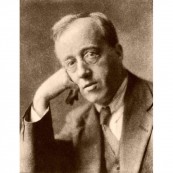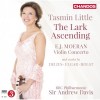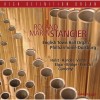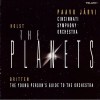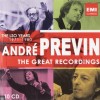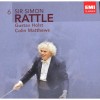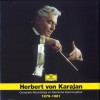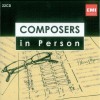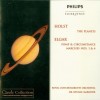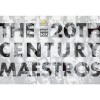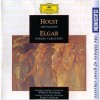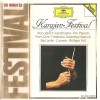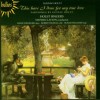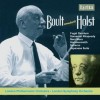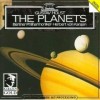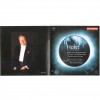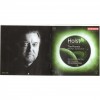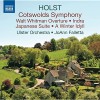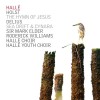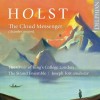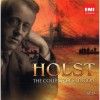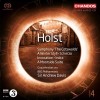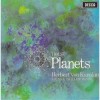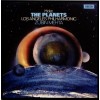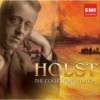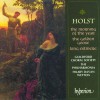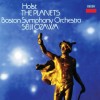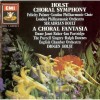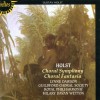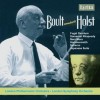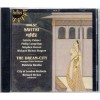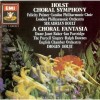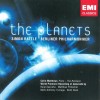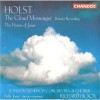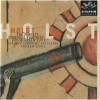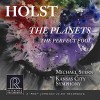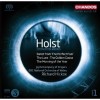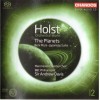传记
His early works show the influence of Grieg, Wagner, Richard Strauss and fellow student Ralph Vaughan Williams, and later, through Vaughan Williams, the music of Ravel. The combined influence of Ravel, Hindu spiritualism and English folk tunes[4] enabled Holst to free himself of the influence of Wagner and Strauss and to forge his own style. Holst's music is well known for unconventional use of metre and haunting melodies.
Holst composed almost 200 works, including operas, ballets, choral hymns and songs. An enthusiastic educator, Holst became music master at St Paul's Girls' School in 1905 and director of music at Morley College in 1907, continuing in both posts until retirement.
He was the brother of Hollywood actor Ernest Cossart and father of the composer and conductor Imogen Holst, who wrote a biography of him in 1938
Holst was born on 21 September 1874, at 4 Pittville Terrace (named today Clarence Road). Cheltenham, Gloucestershire, England[1][6]The house has been opened as a museum devoted to Holst's life and times since 1974, devoted partly to him and partly to illustrating local domestic life of the mid-19th century.
Holst's great-grandfather, Matthias von Holst, was of Scandinavian origin, and came to England in 1802 from Riga. His son Gustavus moved to England with his parents as a child; he became a composer of salon-style harp music and a notable harp teacher. Holst's father, Adolph von Holst, was organist and choirmaster at All Saints' Church in Pittville.He also gave both piano lessons and recitals, most regularly at the Assembly Rooms. Holst's mother, Clara von Holst, who died in 1882, was a singer who bore two sons, Gustav and Emil Gottfried (who later became Ernest Cossart, a film actor in Hollywood), Following his wife's death, Adolph von Holst eventually remarried,and had two further sons.
Holst was christened Gustavus Theodore von Holst, after his grandfather and his great-uncle Theodor, a painter. He was a frail child with neuritis in his arm which plagued him for the rest of his life. His early recollections were musical; he was taught to play the piano and violin, and began composing when he was about twelve. He also started to play the trombone when his father thought this might improve his son's asthma. He was educated at Cheltenham Grammar School for Boys. He began composition at school, writing piano pieces, organ voluntaries, songs, anthems and a Symphony in C minor (from 1892). He was also organist and choir master at Wyck Rissington in the Cotswolds.
He attended the Royal College of Music on a scholarship, where he studied composition with Charles Villiers Stanford and where in 1895 he met fellow student Ralph Vaughan Williams,who became a lifelong friend. Vaughan Williams's own music was in general quite different from Holst’s, but he praised Holst's work abundantly and the two men developed a shared interest in exploring and maintaining the English vocal and choral tradition as found primarily in folk song, madrigals and church music. Holst and Vaughan Williams were able to criticise each other's compositions as they were being written. They never lost this degree of mutual trust.
While at the Royal College of Music, Holst fell in love with the music of Wagner, which he was able to hear at Covent Garden. He also came under the influence of William Morris, joining the Hammersmith Socialist Society and attending lectures by Morris and George Bernard Shaw (with whom he shared a passion for vegetarianism ). Holst remained a socialist all his life. He was also invited to conduct the Hammersmith Socialist Choir, teaching them Madrigals by Thomas Morley, choruses by Purcell, extracts from Wagner as well as works by Mozart and himself.
Holst had hoped to build his career partly as a pianist, but stricken from adolescence with a nerve condition that increasingly affected the movement of his right hand, he eventually gave up the piano for the trombone. He was good enough to earn employment with the Carl Rosa Opera Company and the Scottish Orchestra (forerunner of the Royal Scottish National Orchestra) although his salary was only just enough to live on.
He also played in a popular orchestra called the "White Viennese Band", conducted by Stanislas Wurm. The music was cheap and repetitive and not to Holst's liking, and he referred to this kind of work as "worming" (a pun on Wurm's name, which means "worm" in German) and regarded it as "criminal". His need to "worm" came to an end as his compositions became more successful, and his income was given stability by his teaching posts. With his finances secure, Holst married Emily Isobel Harrison, a fair-headed soprano, at Fulham Register Office on 22 June 1901, their union enduring until his death in 1934. Emily Isobel bore him a daughter, Imogen, on 12 April 1907; to be their only child.
The poetry of Walt Whitman also had a profound effect on Holst, as it did with many of his contemporaries, and he set Whitman's words in "Dirge for Two Veterans" and The Mystic Trumpeter (1904). He also set poetry by Thomas Hardy] and Robert Bridges. Holst also wrote an orchestral Walt Whitman Overture in 1899, which was given a world premiere recording by the Munich Symphony Orchestra, as well as a recording by the London Philharmonic Orchestra.
During these years Holst also became interested in Hindu mysticism and spirituality, and this interest led to the composition of several works set to translations of Sanskrit texts, including: Sita (1899–1906), a three-act opera based on an episode in the Ramayana; Sāvitri (1908), a chamber opera based on a tale from the Mahabharata; 4 groups of Hymns from the Rig Veda (1908–14); and two texts originally by Kalidasa: Two Eastern Pictures (1909–10) and The Cloud Messenger (1913). The texts of these last three works were translated by Holst himself. To make these translations from Sanskrit to English, Holst enrolled at University College London (UCL) to study the language as a 'non-matriculated' student. On 14 January 1909 he paid 5 guineas for Sanskrit classes during the spring and summer terms of that year. The UCL records also show that during this time he moved from 23 Grena Road in Richmond, to 10 The Terrace in Barnes. On 19 October 1909 he re-enrolled at UCL for the autumn term and paid 3 guineas "special fee" for his Sanskrit classes of "2 hours a week". The records end at this point, and so it seems he only spent one year as a student at UCL.
In 1904 Holst took up his first teaching job as music master at James Allen's Girls' School in West Dulwich, South London.
In 1905, Holst was appointed Director of Music at St Paul's Girls' School in Hammersmith, London. In 1907, Holst also became director of music at Morley College. These were the most important of his teaching posts, and he retained both until the end of his life.
During the first two decades of the 20th century, musical society as a whole (and Holst's friend Vaughan Williams in particular) became interested in old English folksongs, madrigal singers, and Tudor composers. Holst shared in his friend’s admiration for the simplicity and economy of these melodies, and their use in his compositions is one of his music’s most recognisable features.
Holst was an avid rambler. He walked extensively in Italy, France and England. He also travelled outside the bounds of Europe, heading to French-controlled Algeria in 1908 on doctor's orders as a treatment for asthma and the depression that crippled him after his submission failed to win the Ricordi Prize, a coveted award for composition. His travels in Arab and Berber lands, including an extensive cycling tour of the Algerian Sahara, inspired the suite Beni Mora, written upon his return.
After the lukewarm reception of his choral work The Cloud Messenger in 1912, Holst was again off travelling, financing a trip to Spain with fellow composers Balfour Gardiner and brothers Clifford and Arnold Bax with funds from an anonymous donation. Despite being shy, Holst was fascinated by people and society, and had always believed that the best way to learn about a city was to get lost in it. In Girona, Catalonia, he often disappeared, only to be found hours later by his friends having abstract debates with local musicians. It was in Spain that Clifford Bax introduced Holst to astrology, a hobby that was to inspire the later Planets suite. He read astrological fortunes until his death, and called his interest in the stars his "pet vice".
Shortly after his return in 1913, St Paul's Girls School opened a new music wing, and Holst composed the still popular St Paul's Suite for the occasion. In 1913, Stravinsky premiered The Rite of Spring, sparking riots in Paris and caustic criticism in London. A year later, Holst first heard Schoenberg’s Five Pieces for Orchestra, an "ultra-modern" set of five movements employing "extreme chromaticism" (the consistent use of all 12 musical notes). Although he had earlier lampooned the stranger aspects of modern music, the new music of Stravinsky[4] and Schoenberg influenced his work on The Planets.
Holst's compositions include works for wind band, and have become standards in the repertoire. His most famous are the First Suite in E-flat for Military Band of 1909 and the Second Suite in F for Military Band of 1911 (see also Hammersmith, below). He also wrote the "Moorside Suite" for brass band in 1928, the first recognised 'classical' composer to treat the medium seriously[23].
Holst and wife Isobel bought a cottage in Thaxted, Essex and, surrounded by medieval buildings and ample rambling opportunities, he started work on the suite that became his best known work, the orchestral suite The Planets. Holst himself adapted the theme from "Jupiter" as a hymn tune under the name of "Thaxted", specifically for the words "I Vow to Thee My Country". (According to the documentary by Tony Palmer In the Bleak Midwinter, Holst hated this association because the text was the opposite of what he believed. This is a little surprising, though, since he had made the adaptation himself in 1921.) His daughter Imogen later recalled of "I Vow to Thee" that "At the time when he was asked to set these words to music, Holst was so over-worked and over-weary that he felt relieved to discover they 'fitted' the tune from Jupiter".
While living in Thaxted, Holst became friendly with Rev. Conrad Noel, the famous 'Red Vicar', who supported the Independent Labour Party and espoused many unpopular causes. Holst became an occasional organist and choir master at Thaxted Parish Church and began an annual music festival at Whitsuntide in 1916, at which students from Morley College and St Paul's School performed. His best-known partsong, 'This Have I Done For My True Love' , was dedicated to Noel and often performed with dancing during religious ceremonies at Thaxted. This was controversial, as the Church of England still retained much of the Puritan ethic in its services. (The singing of non-biblical texts had been allowed only as recently as 1820, and religious dancing harked back to pre-Reformation times.) As late as 1951 at the Leith Hill Festival, singers from the Anglican tradition objected to the words of Holst's partsong, which mention dance and religion together. Vaughan Williams, who was conducting, advised the objectors to vocalise and leave the words to those singers who did not share the inhibition. Controversy surrounded Holst's friendship with Noel, whose opinions grew progressively uncompromising, leading to his displaying the Red Flag and that of Sinn Fein in the church. Holst's view was that Noel's philosophy was a "gospel of comic hate", but he ceased to hold the music festival at Thaxted after three seasons, moving it to Dulwich.
Other tunes that also became attached to hymns were Cranham which is the usual tune to Christina Rossetti's poem In the Bleak Midwinter and Sheen which is attached to a versification of the recessional From glory to glory advancing from the Orthodox Christian Liturgy of Saint James.
At the onset of World War I, Holst tried to enlist but was rejected because of his bad eyes, bad lungs and bad digestion. He dropped the "von" from his name in 1916 in response to anti-German sentiment, making it official by deed poll in 1918.
His new music, however, benefited from the growing demand for new English music. This was partly in response to an embargo on contemporary German music that saw very few performances of Richard Strauss and Max Reger throughout the war (although older generations of German composers remained as popular as ever, culminating in a run of Die Walküre, conducted by Thomas Beecham, in 1918). Towards the end of the war he was offered a post within the YMCA’s educational work programme as musical director and he set off for Salonica (present day Thessaloniki, Greece) and Constantinople (now Istanbul) in 1918. While he was teaching music to troops eager to escape the drudgery of army life, The Planets was being performed to audiences back home. Shortly after his return after the war’s end, Holst composed Ode to Death, based upon a poem by Walt Whitman.
During the years 1920–1923, Holst's popularity grew through the success of The Planets and The Hymn of Jesus (1917) (based on the Apocryphal gospels), and the publication of a new opera, The Perfect Fool (a satire of a work by Wagner). Holst became something of "an anomaly, a famous English composer", and was busy with conducting, lecturing and teaching obligations. He hated publicity; he often refused to answer questions posed by the press and when asked for his autograph, handed out prepared cards that read, "I do not hand out my autograph". Always frail, after a collapse in 1923 he retired from all teaching (other than at St Paul's School, where he was still teaching at his death) to devote the remaining (eleven) years of his life to composition.
Holst's 'retirement' was immediately productive, with the First Choral Symphony to words by Keats (a Second Choral Symphony to words by George Meredith exists only in fragments). A short Shakespearian opera, At the Boar's Head, followed quickly, although neither had the immediate popular appeal of A Moorside Suite for brass band of 1928.
Holst took advantage of new technology to publicise his work through sound recordings and the BBC’s wireless broadcasts. He began to conduct the London Symphony Orchestra for the Columbia company in 1922, using the acoustic process; his recordings of the period include Beni Mora , the Marching Song and (remarkably) the complete Planets. Although, as his daughter Imogen noted, he couldn't quite achieve the gradual fade-out of women's voices and orchestra he had written (owing to the limitations of early recording), it was a landmark recording of the work. Holst conducted it again, with the same orchestra and for the same company, in an electrical recording of 1926. All performances have been issued on LP and CD format.
In 1927 he was commissioned by the New York Symphony Orchestra to write a symphony. Instead, he wrote an orchestral piece based on Thomas Hardy's Wessex, a work that became Egdon Heath and which was first performed a month after Hardy’s death, in his memory. By this time, Holst was going out of fashion, and the piece was poorly reviewed (although this may have as much to do with the austere nature of the work). However, Holst is said to have considered the short, subdued but powerful tone poem his "best work"] . The piece has been much better received in recent years, with several recordings available. Holst did complete a scherzo for the symphony before his death; this music has been recorded.
Towards the end of his life, Holst wrote Choral Fantasia (1930), and he was commissioned by the BBC to write a piece for military band; the resulting Hammersmith was a tribute to the place where he had spent most of his life, a musical expression of the London borough (of Hammersmith), which begins with an attempt to recreate the haunting sound of the River Thames sleepily flowing its way. He then made an orchestral version of this work for its first performance, sharing the programme with the London premiere of Walton's Belshazzar's Feast. This unlucky coincidence may account for its subsequent obscurity as an orchestral work.
Interested as ever in new mediums, Holst wrote a score for the Associated Sound Film Industries picture 'The Bells' in which Holst believed he appeared as an extra in a crowd scene. However, he was mortified when he heard the quality of the 1931 soundtrack. The film was the victim of poor marketing and no copy can now be traced.[34] He also wrote a 'jazz band piece' that his daughter later arranged for orchestra as Capriccio. A late flowering of academic life came when Harvard University offered him a lectureship for the first six months of 1932.
Holst had a lifetime of poor health, which worsened due to a concussion during a backward fall from the conductor's podium in 1923, from which he never fully recovered.[6] In his final four years, Holst grew ill with stomach problems. One of his last compositions, the Brook Green Suite, named after the land on which St Paul’s Girls’ School was built, was performed for the first time a few months before his death. Holst died on 25 May 1934, of complications following stomach surgery, in London. His ashes were interred at Chichester Cathedral in West Sussex, with Bishop George Bell giving the memorial oration at the funeral.





